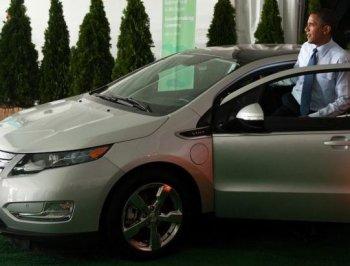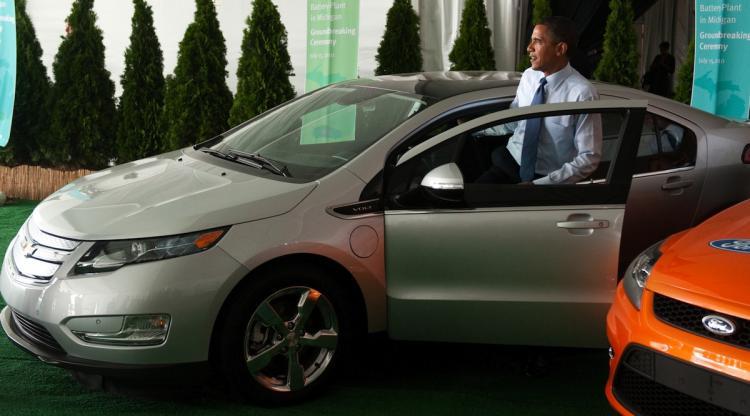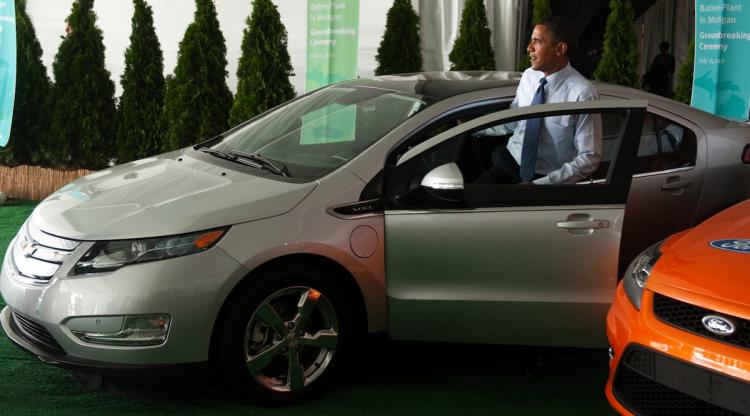With mainstream automakers such as Chevrolet and Nissan set to release electric vehicles into the market, interest in electric cars is on the rise among Americans.
Almost half of all interviewees participating in a Consumer Electronics Association (CEA) survey said that they would look into and test-drive an electric car.
Overall consumer knowledge about electric cars is still rather shallow, with only 32 percent of interviewees having done some research about alternative fuel cars, and only one-quarter indicating more than just a smidgen of knowledge about electric cars.
“For a new product category, interest in electric vehicles is strong and likely to grow as more vehicles enter the market and consumers become more aware of them,” said Chris Ely, manager at CEA, in a recent statement.
CEA’s press release summarizes the overall consumer concerns: “Concerns about mileage potential before needing to recharge (50 percent) and battery life (34 percent) top the list. Cost of the vehicle, reliability and availability of charging stations are also key concerns many consumers have.”
There is concern over battery life and the lack of charging stations, and a reluctance to go for untried and untested technology.
“Electric vehicles (or EVs) are very different than cars as we know them. Rather than having a car with an engine, a gas tank, and a small battery to start the engine, an EV is a singular unit with electric motors driving the wheels full time, entirely replacing the engine and gas tank,” according to an article on the U.S. Department of Energy website.
But “environmental benefits, coupled with potential cost savings in fuel and tune-ups, will lead to increased interest for electric vehicles and potential floor traffic at dealerships,” said Ely.
Pricing Electric Cars
Nissan Motor Company Ltd. announced earlier this year that it would bring the Nissan LEAF—a 100 percent electric five-door family sedan—to market late 2010 at a cost of $32,780, reduced to $25,280 through a federal tax credit.
“At $3.50 per gallon, a car that gets 25 miles per gallon has a fuel cost of 14 cents per mile. At $0.23 per kilowatt-hour, the Nissan LEAF has a fuel cost of 5 cents per mile,” said Nissan on its website.
The Chevrolet Volt, a four-seat, four-door partially electric car, will hit the market in November and come with a $33,500 price tag, net after the federal tax credit.
“The 2011 Chevy Volt plug-in hybrid is arguably the most fuel-efficient car on the market, but it’s pricey for what you get,” according to the car review website Edmunds.
Calculating the cost of owning an electric car is quite complex. It depends on the needs of the customer. If a customer uses it to commute to and from work, drives it only in close proximity to the home, and plugs it into an electric outlet every night to keep the battery from running low, it is highly cost-effective.
But having more than a 100-mile commute requires gasoline for at least 60 miles and refueling is needed rather frequently due to the small tank. In such cases, the costs add up.
Tesla Motors Inc. publicized on its website that fueling an electric car is by far the cheapest among all options and could be as low as $.02 per mile, while a gasoline-driven car starts at around $.15 per mile.
Average annual fuel cost for a gasoline-driven car runs around $1,625. A hybrid runs around $796, while a plug-in hybrid runs around $521. A car running on fuel cells averages around $821, and lastly, a vehicle powered by electricity would cost around $279.
U.S. Government Rallying to the Call
Tesla, which went public on the NASDAQ Stock Exchange in June, received a $465 million federal loan to develop electric cars in California. Ford Motor Company was awarded $5.9 billion in loans to build electric and combustion engines in the United States, and Nissan Motor Company Ltd. received a $1.6 billion loan for the production of battery packs at U.S. locations.
The Obama Administration announced that the loans are meant to create jobs, develop fuel-efficient vehicles, and give the country a competitive edge in the global market.
President Obama said in a statement, “We have an historic opportunity to help ensure that the next generation of fuel-efficient cars and trucks are made in America.”
Ongoing legislative efforts could increase consumer tax credits by $2,500 and provide a quarter of a million dollars in grants, along with a slew of other incentives for consumers and manufacturers.
Sen. Debbie Stabenow, D-Mich., introduced legislation under the Charging America Forward Act that would provide incentives for consumers to buy an electric car. Under this bill, the consumer will get a $7,500 deduction when buying an electric car.
“This legislation will give consumers the value of the credit up front rather than making them wait until they file their taxes. Dealers will be able [to] subtract the credit from the price of the car,” Stabenow said in a statement.
In July, the Senate Energy Committee approved legislation sponsored by Sen. Byron Dorgan, D-N.D. The bill calls for specially designated locations for charging up electric vehicles throughout the country.
“The goal is to put the nation on a path to electrify half its cars and trucks by 2030, which if achieved, would cut U.S. demand for oil by about one-third,” Dorgan said in a statement.
Private Sector Charging Ahead
“The Roadmap targets a transition to electric vehicles until, by 2040, 75 percent of U.S. passenger vehicle miles traveled would be ‘electric miles,’” announced the University of Maryland Interindustry Forecasting project team in a 2010 study titled the Economic Impact of the Electrification Roadmap. This study was paid for by the Electrification Coalition, a nonprofit, nonpartisan group of industry leaders.
Companies in the lead in developing electric-vehicle technology are Honeywell International Inc., Johnson Controls Inc., and the Carrier Corp. subsidiary Noresco LLC, according to Pike Research, a market research firm.
The fuel-efficient market in the United States “will more than triple in size in the next 10 years, increasing from $5.6 billion annually in 2009 to approximately $19.9 billion by 2020,” predicts Pike Research.
{etRelated39555, 39208}Coulomb Technologies has taken the lead in establishing an electric car charging station infrastructure. Since being awarded a $3.4 million award by the California Energy Commission, Coulomb has installed ChargePoint electric car charging stations in Anaheim and San Jose, Calif., and promised to match these funds with an additional $7 million from corporate coffers.
“California is leading the charge and will soon have thousands of networked charging stations installed thanks to this grant from the Energy Commission,” said Richard Lowenthal, CEO of Coulomb.
Almost half of all interviewees participating in a Consumer Electronics Association (CEA) survey said that they would look into and test-drive an electric car.
Overall consumer knowledge about electric cars is still rather shallow, with only 32 percent of interviewees having done some research about alternative fuel cars, and only one-quarter indicating more than just a smidgen of knowledge about electric cars.
“For a new product category, interest in electric vehicles is strong and likely to grow as more vehicles enter the market and consumers become more aware of them,” said Chris Ely, manager at CEA, in a recent statement.
CEA’s press release summarizes the overall consumer concerns: “Concerns about mileage potential before needing to recharge (50 percent) and battery life (34 percent) top the list. Cost of the vehicle, reliability and availability of charging stations are also key concerns many consumers have.”
There is concern over battery life and the lack of charging stations, and a reluctance to go for untried and untested technology.
“Electric vehicles (or EVs) are very different than cars as we know them. Rather than having a car with an engine, a gas tank, and a small battery to start the engine, an EV is a singular unit with electric motors driving the wheels full time, entirely replacing the engine and gas tank,” according to an article on the U.S. Department of Energy website.
But “environmental benefits, coupled with potential cost savings in fuel and tune-ups, will lead to increased interest for electric vehicles and potential floor traffic at dealerships,” said Ely.
Pricing Electric Cars
Nissan Motor Company Ltd. announced earlier this year that it would bring the Nissan LEAF—a 100 percent electric five-door family sedan—to market late 2010 at a cost of $32,780, reduced to $25,280 through a federal tax credit.
“At $3.50 per gallon, a car that gets 25 miles per gallon has a fuel cost of 14 cents per mile. At $0.23 per kilowatt-hour, the Nissan LEAF has a fuel cost of 5 cents per mile,” said Nissan on its website.
The Chevrolet Volt, a four-seat, four-door partially electric car, will hit the market in November and come with a $33,500 price tag, net after the federal tax credit.
“The 2011 Chevy Volt plug-in hybrid is arguably the most fuel-efficient car on the market, but it’s pricey for what you get,” according to the car review website Edmunds.
Calculating the cost of owning an electric car is quite complex. It depends on the needs of the customer. If a customer uses it to commute to and from work, drives it only in close proximity to the home, and plugs it into an electric outlet every night to keep the battery from running low, it is highly cost-effective.
But having more than a 100-mile commute requires gasoline for at least 60 miles and refueling is needed rather frequently due to the small tank. In such cases, the costs add up.
Tesla Motors Inc. publicized on its website that fueling an electric car is by far the cheapest among all options and could be as low as $.02 per mile, while a gasoline-driven car starts at around $.15 per mile.
Average annual fuel cost for a gasoline-driven car runs around $1,625. A hybrid runs around $796, while a plug-in hybrid runs around $521. A car running on fuel cells averages around $821, and lastly, a vehicle powered by electricity would cost around $279.
U.S. Government Rallying to the Call
Tesla, which went public on the NASDAQ Stock Exchange in June, received a $465 million federal loan to develop electric cars in California. Ford Motor Company was awarded $5.9 billion in loans to build electric and combustion engines in the United States, and Nissan Motor Company Ltd. received a $1.6 billion loan for the production of battery packs at U.S. locations.
The Obama Administration announced that the loans are meant to create jobs, develop fuel-efficient vehicles, and give the country a competitive edge in the global market.
President Obama said in a statement, “We have an historic opportunity to help ensure that the next generation of fuel-efficient cars and trucks are made in America.”
Ongoing legislative efforts could increase consumer tax credits by $2,500 and provide a quarter of a million dollars in grants, along with a slew of other incentives for consumers and manufacturers.
Sen. Debbie Stabenow, D-Mich., introduced legislation under the Charging America Forward Act that would provide incentives for consumers to buy an electric car. Under this bill, the consumer will get a $7,500 deduction when buying an electric car.
“This legislation will give consumers the value of the credit up front rather than making them wait until they file their taxes. Dealers will be able [to] subtract the credit from the price of the car,” Stabenow said in a statement.
In July, the Senate Energy Committee approved legislation sponsored by Sen. Byron Dorgan, D-N.D. The bill calls for specially designated locations for charging up electric vehicles throughout the country.
“The goal is to put the nation on a path to electrify half its cars and trucks by 2030, which if achieved, would cut U.S. demand for oil by about one-third,” Dorgan said in a statement.
Private Sector Charging Ahead
“The Roadmap targets a transition to electric vehicles until, by 2040, 75 percent of U.S. passenger vehicle miles traveled would be ‘electric miles,’” announced the University of Maryland Interindustry Forecasting project team in a 2010 study titled the Economic Impact of the Electrification Roadmap. This study was paid for by the Electrification Coalition, a nonprofit, nonpartisan group of industry leaders.
Companies in the lead in developing electric-vehicle technology are Honeywell International Inc., Johnson Controls Inc., and the Carrier Corp. subsidiary Noresco LLC, according to Pike Research, a market research firm.
The fuel-efficient market in the United States “will more than triple in size in the next 10 years, increasing from $5.6 billion annually in 2009 to approximately $19.9 billion by 2020,” predicts Pike Research.
{etRelated39555, 39208}Coulomb Technologies has taken the lead in establishing an electric car charging station infrastructure. Since being awarded a $3.4 million award by the California Energy Commission, Coulomb has installed ChargePoint electric car charging stations in Anaheim and San Jose, Calif., and promised to match these funds with an additional $7 million from corporate coffers.
“California is leading the charge and will soon have thousands of networked charging stations installed thanks to this grant from the Energy Commission,” said Richard Lowenthal, CEO of Coulomb.






